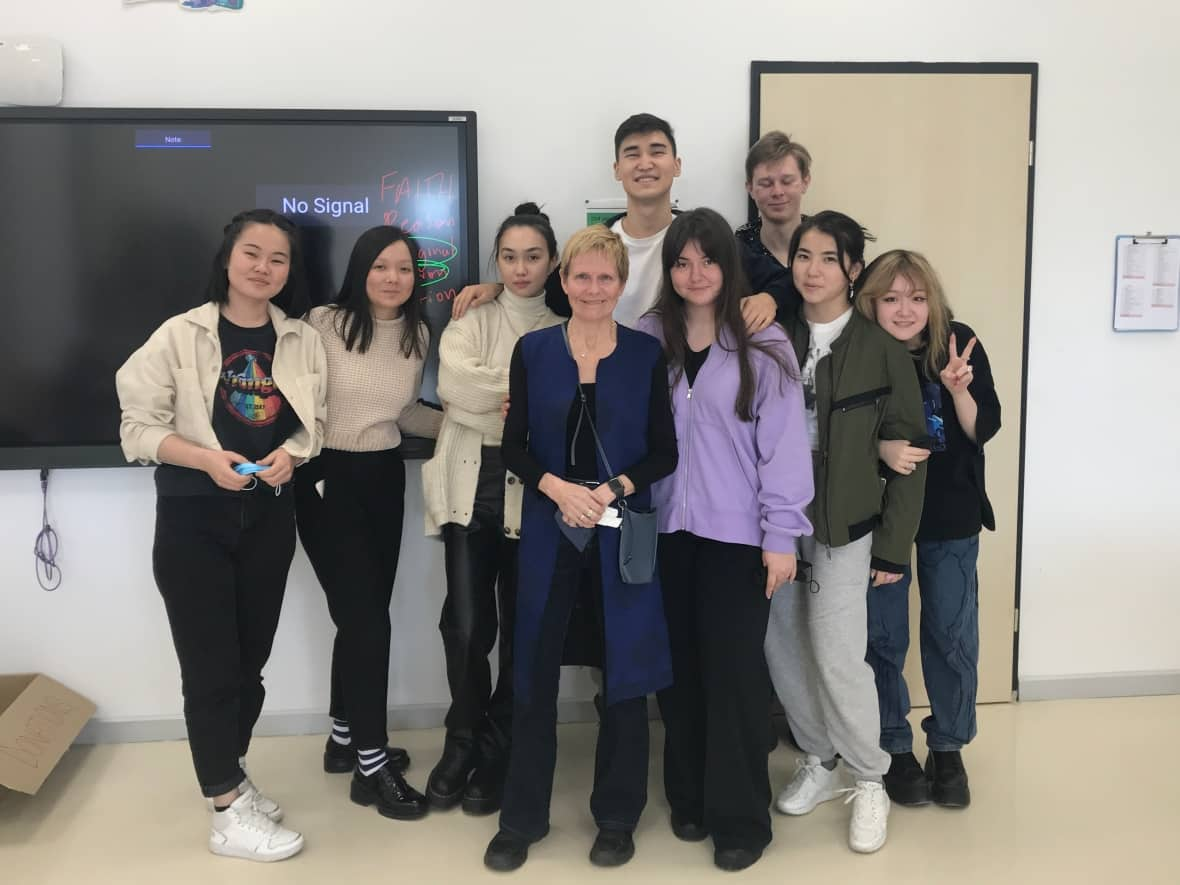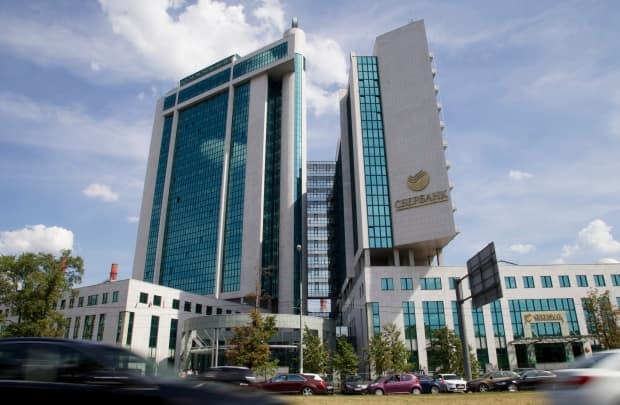Sanctions still blocking bank transfers for Canadians with no ties to Putin

More than 13 months after the invasion of Ukraine, Canadians with no ties to President Vladimir Putin or his regime remain frustrated and anxious as salaries earned abroad, retirement investments and even funeral savings sit frozen among the assets caught up in Canada's sanctions net.
Ingrid Morton and her husband Graham are among them. For years, they travelled the world on a series of contracts teaching English at international schools. Their final contract was in Almaty, Kazakhstan.
But when political unrest erupted in street protests and local authorities declared a state of emergency in early 2022 — followed closely by Russia's invasion of Ukraine — they decided to leave the region before their contracts ended. They'd already had a bad experience trying to get out of China when COVID hit. Ingrid was ready to retire.
"I just sort of thought, 'Oh my God, I can't take this anymore. This is crazy,'" she said.
The Mortons now live in Toronto. But not all of the salary they earned teaching in Kazakhstan made it back to Canada with them.
Their school put its foreign teachers' salaries into accounts with Sberbank Kazakhstan, a subsidiary of Sberbank Russia, which was listed among the financial institutions being sanctioned by Canada.
Last year, Sberbank Kazakhstan restructured to escape international sanctions. But that corporate changeover hadn't happened yet when Ingrid made what had been, up to that point, a routine transaction for them as teachers abroad — a money transfer from their school's local Sberbank branch to a CIBC branch in Canada.

Ingrid transferred the couple's money on March 1, 2022 — one week after Canada imposed sanctions on multiple Russian banks.
"I asked the financial person at our school, 'Can I still send money to Canada?' And she said yes," Ingrid said. "I went to the bank and it was total mayhem ... I said, 'Can I send money out?' And they said yes."
Previous transfers to Canada had appeared in their Canadian account within a few days. This one didn't.
"I sent it in good faith that it would arrive," she said. "Sberbank said, 'Well, we've sent it. We're not responsible. It's gone.'"
Global Affairs unresponsive
Ingrid said she believes this transfer, worth about $10,000, was frozen by the Canadian government because of the bank it came from — a bank their employer picked, not them.
"It's not fair," Ingrid said. "Don't they know that Kazakhstan is a separate country? I didn't send such a huge amount like a Russian oligarch's probably going to send ... It seems really stupid on their part to just lump me in with that."
Ingrid applied for a permit to release the couple's money — joining a long queue that's believed to be straining the capacity of Global Affairs Canada (GAC) to run due diligence and grant exemptions. It's impossible to reach anyone at GAC by phone, she said.
"Why is it taking them about a year and I haven't even had an e-mail from a person?" she said, adding that all she and her husband receive back are automated messages.
"How long is the war going to go on? I mean, it could be years and my money's going to be tied up because they can't bother to take a look at individual cases."

While the dollar value of their frozen assets doesn't pose a significant hardship for the Mortons, Ingrid said she feels for those who are missing larger amounts.
"There's a lot of innocent people who are suffering," she said. "I wouldn't expect something like that to be happening in Canada. I would expect fair treatment."
International investors caught up
Derek Nickerson said he doesn't consider himself a wealthy person, but the Nova Scotian retiree was savvy enough about international investing to shop around in other jurisdictions in search of better rates of return for his retirement savings.
He and his wife opened U.S. dollar accounts at ArmSwissBank, based in Armenia, in 2015. Last March, as interest rates shifted, they decided to transfer $35,000 US to an RBC account. He said he saw their money arrive in the account's records on March 17 — and then disappear on March 22.
He contacted RBC and learned that the money had transited through a correspondent bank in Russia — Alfa Bank, which is on Canada's sanctions list.
"When I ask for a SWIFT transfer, I don't know how it's going to come," Nickerson said. He said he didn't learn his transfer had been routed through a sanctioned bank until it was too late.
In the year since, he's struggled to get information from RBC and both U.S. and Canadian officials. He too has applied for an exemption from GAC but has heard little in response.
"I wonder if they're not going to do anything until the war is over," he said.
While his money is frozen, he's not earning interest. He fears it's losing value at a higher rate because of recent high inflation.
"That's our retirement money," he said.
'This is not blood money'
Angelina Ermakov's mother has been a Canadian citizen since 2015, after moving to Ottawa to live with her daughter's family in retirement.
Following a Russian tradition, her mother saved enough money for her funeral — about a million rubles, or $17,000 in Canadian funds — in the Russian bank branch next door to where she used to live in Moscow.
Ermakov finally convinced her mother to move her "funeral money" to her Canadian bank account last February. But the wire transfer from Alfa Bank didn't go through before the sanctions rules kicked in.
"It's all of her savings. That's her peace of mind," Ermakov said. "She asks me every day where they are."
No one in their family is associated with the Putin regime, she said, adding she wonders if her transfer was targeted because of her mother's Russian surname.
"[This is] not blood money, or money supporting the war," said Ermakov, who has lived in Canada since 1990. "We do not support the war because we already made that decision to leave Russia and to come and live in a different country."
Ermakov said she was able to confirm with RBC that the money's being held until and unless GAC authorizes its release. She said she's heard nothing but "radio silence" from the government.
"It's like talking to a wall because there isn't anyone responding or dealing or even reading emails at this point. I mean, it's been a year," she said.
Ermakov works in the federal public service. She said she finds it hard to believe the department's too overwhelmed to process her mother's application quickly.

"It's clear that it's a policy," she said "It is intentional because when there is a volume of work, you hire ... you pay overtime to people, you bring more people to that team or you get another team to work on this issue ... I've seen it done before."
All three of these cases are believed to be among several hundred sitting on Foreign Affairs Minister Mélanie Joly's desk — languishing among the more than $122 million in funds frozen by Canadian authorities since the invasion of Ukraine.
One person who spoke to CBC News earlier this winter finally got access to her family's savings last month.
The RCMP, which tracks the total amounts of frozen assets and blocked transactions under Canada's Special Economic Measures Act, told CBC News on Monday that its tally has not changed substantially since December.
"Canada is judicious in its approach to deploying sanctions and we are committed to their effective and coordinated use," Grantly Franklin, a media spokesperson for the department, wrote in response to specific CBC questions about the department's backlog in processing exemption requests.
In October, the federal government allocated an additional $76 million to sanctions administration. "Global Affairs Canada will use its portion of this investment to expand the capacity of the sanctions policy and coordination team," Franklin said.
"Our sanctions aim to apply pressure on foreign actors, not on Canadians."


